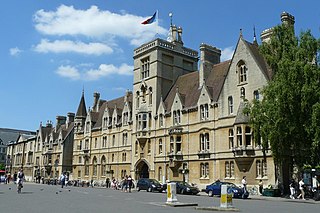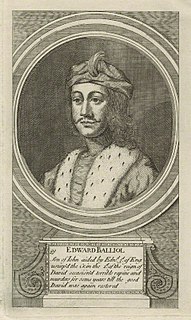Notes
| Portals Access related topics |
| This article relating to the University of Oxford is a stub. You can help Wikipedia by expanding it. |
Richard Barningham was an English academic during the 16th-century: [1] he was Master of Balliol from 1504 to 1511. [2]
| This article relating to the University of Oxford is a stub. You can help Wikipedia by expanding it. |

The Wars of Scottish Independence were a series of military campaigns fought between the Kingdom of Scotland and the Kingdom of England in the late 13th and early 14th centuries.

John Balliol, known derisively as Toom Tabard, was King of Scots from 1292 to 1296. Little is known of his early life. After the death of Margaret, Maid of Norway, Scotland entered an interregnum during which several competitors for the Crown of Scotland put forward claims. Balliol was chosen from among them as the new King of Scotland by a group of selected noblemen headed by King Edward I of England.

Balliol College is one of the constituent colleges of the University of Oxford in England. One of Oxford's oldest colleges, it was founded around 1263 by John I de Balliol, a rich landowner from Barnard Castle in County Durham, who provided the foundation and endowment for the college. When de Balliol died in 1269 his widow, Dervorguilla, a woman whose wealth far exceeded that of her husband, continued his work in setting up the college, providing a further endowment, and writing the statutes. She is considered a co‑founder of the college.

Trinity College is one of the constituent colleges of the University of Oxford in England. The college was founded in 1555 by Sir Thomas Pope, on land previously occupied by Durham College, home to Benedictine monks from Durham Cathedral.
The Battle of Dupplin Moor was fought between supporters of the infant David II, the son of Robert the Bruce, and rebels supporting the Balliol claim in 1332. It was a significant battle of the Second War of Scottish Independence. The battlefield was added to the Inventory of Historic Battlefields in Scotland in 2011.

The House of Balliol was a noble family originating from the village of Bailleul in Picardy. They held estates in England, granted during the reign of King William Rufus. Through marriage, they had claims to the Throne of Scotland. One member of the family, John Balliol, was named King of Scotland after the disputed succession following extinction of the Dunkeld line. John was deposed, leading to the First War of Scottish Independence. His son, Edward Balliol, also briefly controlled the Scottish throne during the Second War of Scottish Independence. Edward had no issue, and the direct line went extinct with him.

John de Balliol was a leading figure of Scottish and Anglo-Norman life, belonging to the House of Balliol. Balliol College, in Oxford, is named after him.
When the crown of Scotland became vacant in September 1290 on the death of the child monarch Margaret, the Maid of Norway, a total of thirteen claimants to the throne came forward. Those with the most credible claims were John Balliol, Robert Bruce, John Hastings and Floris V, Count of Holland.
The Oxford University Mountaineering Club (OUMC) was founded in 1909 by Arnold Lunn, then a Balliol undergraduate; he did not earn a degree.
The Snell Exhibition is an annual scholarship awarded to students of the University of Glasgow to allow them to undertake postgraduate study at Balliol College, Oxford. The award was founded by the bequest of Sir John Snell in a will made in 1677, although the original stipulation referred to the University of Oxford, rather than Balliol in particular. Snell died on 6 August 1679, but wrangling over the will meant that it was nearly twenty years before the first scholarships were awarded; the first four Snell Exhibitioners were admitted to Balliol in mid-1699.

The Battle of Culblean was fought on 30 November 1335, during the Second War of Scottish Independence. It was a victory for the Scots led by the Guardian, Sir Andrew Murray over an Anglo-Scots force commanded by David III Strathbogie, titular Earl of Atholl, and a leading supporter of Edward Balliol.

The Boulton Paul Balliol and Sea Balliol are monoplane military advanced trainer aircraft built for the Royal Air Force (RAF) and the Royal Navy Fleet Air Arm (FAA) by Boulton Paul Aircraft. Developed in the late 1940s, the Balliol was designed to replace the North American Harvard trainer. It used the Rolls-Royce Merlin engine. The Sea Balliol was a naval version for deck landing training.
Events from the 1330s in England.

Bailleul is a commune in the Somme department in Hauts-de-France in northern France.

Balliol College Boat Club (BCBC) is the rowing club for members of Balliol College, Oxford, England. It is one of the college boat clubs at the University of Oxford.

Edward Balliol was a pretender to the Scottish throne during the Second War of Scottish Independence. With English help, he ruled parts of the country from 1332 to 1356.
The Second War of Scottish Independence, also known as the Anglo-Scottish War of Succession (1332–1357) was the second cluster of a series of military campaigns fought between the Kingdom of Scotland and the Kingdom of England in the late 13th and early 14th centuries.
Robert Thwaits was an English medieval academic administrator.
Events from the year 1332 in the Kingdom of Scotland.
Events from the year 1292 in the Kingdom of Scotland.